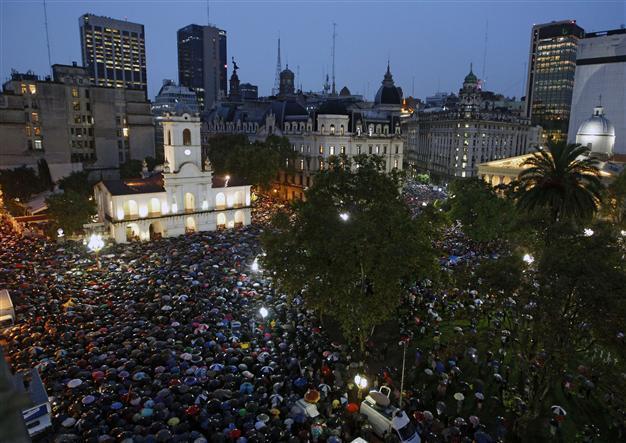Thousands rally in Buenos Aires over Nisman death
BUENOS AIRES - Agence France-Presse

People gather at Plaza de Mayo square during the "Marcha del silencio" (Silence March) called by Argentine prosecutors in memory of their late colleague Alberto Nisman in Buenos Aires on February 18, 2015. AFP Photo.
Tens of thousands of people demanding justice marched in symbolic silence on Feb. 18 in soaking Buenos Aires to mark a month since the suspicious death of a prosecutor who was ready to accuse the Argentine president of a massive cover-up.
"I am here because I want to see justice done for someone who gave his life for the truth," said teacher Marta Canepa, 65, among those traipsing the 1.7 kilometers (just over a mile) under the banner "Homage for Prosecutor Alberto Nisman."
Drenched in driving rain and led by prosecutors and opposition figures, the rally is the first major public show of defiance in a murky case that has ignited a political firestorm in Argentina and piled the pressure on President Cristina Kirchner, 61, in her last year in office.
Thousands also gathered in solidarity with the marchers in the cities of Rosario and Cordoba, in the resort of Mar del Plata, and in the northwest Tucuman province.
Among those who braved the relentless deluge in the capital were Nisman's two young daughters and his ex-wife, Judge Sandra Arroyo Delgado. People in the crowd applauded them when they recognized the three, dripping as they walked.
"The march itself is a reflection of society's underlying demand for an end to impunity. Tension between the justice system and executive were there before, but the Nisman case has exacerbated them," said sociologist Rosendo Fraga with pollsters Nueva Mayoria.
There were contrasting figures for the number at the rally in Buenos Aires: local police said 400,000 people attended, but federal police said it was nearer 50,000.
Nisman was found in his Buenos Aires apartment with a bullet through his head on January 18, the day before he was to go before a congressional hearing to air his finding that Kirchner and her foreign minister plotted to shield Iranian officials implicated in the bombing of the AMIA Jewish-Argentine charity federation.
Eighty-five people were killed and more than 300 injured in the attack, the deadliest in Argentina's history -- and one that has yet to be solved 21 years later.
Kirchner -- Argentina's first democratically elected woman president and who is not seeking reelection -- left the city with her cabinet ahead of the march, delivering a speech from the city of Zarate after inaugurating a nuclear power plant.
Her government slammed the rally as "golpista" -- seeking to destabilize the government.
In a televised speech just hours before the march began, Kirchner also suggested that unnamed outside interests were somehow behind the scandal.
"I ask you to open wide your eyes," she said. "I am not talking about conspiracies. It is a world of interests that want to subordinate others, and they are confronting governments like this one that let no one set limits for us."
Her top aides suggested that the United States and Israel were trying to drag Argentina into the Middle East conflict.
Investigators initially said the death of the 51-year-old Nisman appeared to be suicide, but homicide has not been ruled out.
Nisman was found sprawled in his bathroom, with his back blocking the door and a .22-caliber pistol next to him. He was killed with a single shot to his temple.
In Argentina, the suicide theory is widely disbelieved -- even by Kirchner, who has suggested that he was killed by former intelligence agents in an elaborate plot to smear her.
Nisman had accused Kirchner four days before his death of obstructing his investigation by cutting a secret deal with Iran in exchange for oil.
In 2006, with the support of former president Nestor Kirchner, the current president's late husband, Nisman charged that the bombing was carried out by Hezbollah with the involvement of top Iranian officials, including former president Akbar Hashemi Rafsanjani.
In 2013, Cristina Kirchner reached a deal with Iran that would have allowed Iranian suspects to be questioned at home, but that agreement never materialized.
Nisman and Argentina's large Jewish community were vehemently opposed, arguing that Tehran could not be trusted.
In his accusation against Kirchner, which was reaffirmed on Friday by his replacement, Gerardo Pollicita, Nisman said the Argentine leader was working behind the scenes to protect the Iranians in return for oil, at a time when the South American country was in the midst of an energy crisis.
He also alleged that Kirchner asked Interpol to lift outstanding "red notices" against the Iranians -- a request that Interpol's former director denied had been made.
